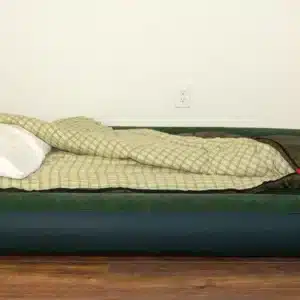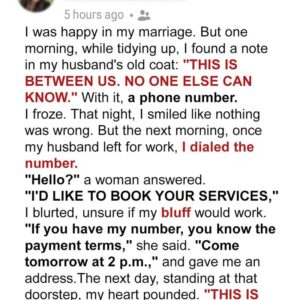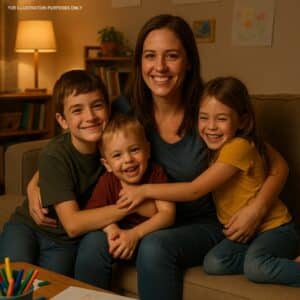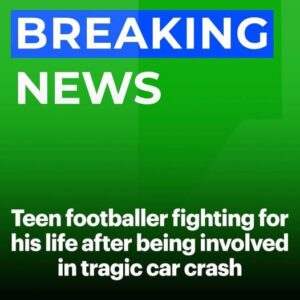Below is a streamlined, fully paraphrased retelling of the article, held close to 1,500 words while keeping its heart and major beats intact.
The January chill in downtown Birmingham bit through coats but never quite managed snow. Outside the revolving doors of Children’s Medical Center, parents hurried past one another, clutching coffee and worry in equal measure. Amid the blur sat nine-year-old Ezekiel “Zeke” Carter on a flattened cardboard box, sketchbook balanced on his knees.
His coat swallowed him, one boot’s toe wrapped in silver duct tape, and a red beanie sagged over his ears. Unlike the grown-ups, he wasn’t rushing anywhere; he simply observed, pencil scratching across paper whenever inspiration struck. Hospital staff had tried to move him along when he first appeared on Saturdays, but the boy caused no trouble. He smiled, nodded, and kept his silent vigil—so they let him stay, assuming he was waiting for a patient inside.
Across the street a silver Range Rover idled at a red curb. Jonathan Reeves, late forties with distinguished gray at the temples, sat behind the wheel looking drained despite the expensive suit creasing at his shoulders. In the back seat, six-year-old Isla―once a fearless tree-climber―nestled in a booster chair beneath a pink blanket. A freak accident had severed the connection between her brain and the lower half of her body, leaving her legs motionless and her family frantic. Jonathan killed the engine, scooped Isla into his arms, and headed for yet another round of specialists. He strode right past Zeke without noticing—most people did—but the boy noticed him. Zeke’s gaze lingered on the way Jonathan held his daughter as though a sudden breeze might shatter her.
Just before father and child disappeared through the doors, Zeke rose and called out, “Sir, I can help your daughter walk again.” The soft confidence in his voice halted Jonathan mid-stride. He turned, suspicion and tired fury colliding behind his eyes. “That isn’t funny,” he muttered. Zeke didn’t waver. “I’m not joking, sir.” There was no sales pitch, no beg for coins—only certainty. Jonathan, half convinced it was some bizarre swindle, hurried inside.
During Isla’s appointments, the boy’s words replayed in Jonathan’s head like static he couldn’t tune out. Therapists spoke of “managing expectations” and “long roads ahead,” phrases he’d memorized and grown to resent. By afternoon, he and Isla emerged into cold sunshine. Zeke was still there, as though expecting them. Irritation flared. Jonathan crossed to him. “Why would you say that? You don’t know her story.” Zeke met his glare. “I don’t have to know her to try.” He explained that his late mother, a physical therapist, had taught him simple techniques—heat, pressure points, faith in the body’s memory. Jonathan gruffly dismissed him, but something in the boy’s calm shook loose a buried scrap of hope. Against his better judgment he growled, “Fine—Harrington Park, noon tomorrow. Don’t be late.”
Sunday, cracked baskets squeaked on the park’s weathered court and a chill wind rattled the swings. Zeke was waiting with a towel, a sock-filled tennis ball, a jar of cocoa butter, and a cloth pouch of warm rice—tools from his mother’s kit. Jonathan rolled Isla up and folded his arms like a shield. Zeke asked Isla’s permission, then draped heated rice over her thighs, massaged gently, rotated joints and chatted about cartoons. Slowly the girl relaxed; slowly Jonathan’s skepticism thawed. After half an hour Zeke tapped Isla’s ankle. “Feel that?” She whispered, “A little…pressure.” It was no miracle, but it wasn’t nothing. Jonathan, still guarded, told Zeke to meet them again next Sunday.
The pattern set. Each week Zeke practiced patience learned far beyond his nine years—heat first, stretching next, conversation throughout. Isla graduated to rubber-band exercises and ball rolls under her arches. Jonathan began kneeling in the grass, copying the motions. He discovered Zeke slept in shelters some nights and skipped school since his mother’s death. Without announcing it, Jonathan started bringing sandwiches and extra mats.
Progress was uneven. On the fourth Sunday Isla arrived tear-streaked, convinced her efforts were pointless. Zeke knelt beside her wheelchair. “You think I never get tired?” he asked, voice raw. He spoke of nights in shelters, of watching his mother help veterans when she could barely afford rent. “Mad’s allowed,” he said. “Quitting isn’t.” Something in his steadiness steadied her. That day, Isla slid one foot forward an inch. Then another. Jonathan watched, stunned, as life crept back into motionless limbs.
Hope, once terrifying, became contagious. Jonathan offered Zeke the guest room in his Crestview-Drive home. The boy arrived clutching a blanket roll and a single backpack. Soon he had a clean bed, regular meals, and a small desk for sketching. Still, he never missed morning stretches with Isla and never accepted money for his help. What he accepted was belonging.
Word got out. A nurse walking her dog saw Isla flexing her toes in the park. She told a colleague, who told a therapist, who mentioned it to a parent. The next Sunday two new families showed up, children in walkers and wheelchairs. Zeke, now called “the helper kid,” divided his time among them, demonstrating towel stretches and rice packs, always making Isla his first session. By the sixth week the park hosted folding chairs, donated bagels, and a dozen families. A reporter chronicled the gatherings under the headline “Nine-Year-Old Ignites Healing in City Park.” Offers of equipment, tutoring, and medical mentorship trickled in. Zeke accepted resources but waved off praise, still wearing the same duct-taped boots.
Isla’s strides, tiny at first, lengthened. One warm Sunday the crowd fell silent as Jonathan and Zeke steadied her upright. “One, two, three…” She stood trembling but firm. A second later Jonathan let go and she remained on her own feet, eyes shining. She dared a step, then another, before collapsing laughing into her father’s arms. Parents cried; children cheered; Zeke simply smiled, eyes shiny, and whispered, “The body remembers.”
That night Jonathan told Zeke, “You changed everything.” The boy answered, “That’s what Mama would have done.” Jonathan realized the thread between grief and purpose weaving through their lives: a father desperate to restore motion, a boy desperate to continue his mother’s calling. Together they’d built a community around second chances.
Nine Sundays in, Harrington Park had transformed. Where squeaky swings once dominated, now chatter and laughter filled the air—kids wobbling through first steps, parents trading encouragement, volunteers passing out hot chocolate. Zeke remained the hub: guiding stretches, checking posture, reminding discouraged faces that progress is rarely loud. He refused spotlight interviews: “It’s not about me—it’s about them.” Yet people couldn’t ignore the boy who arrived with nothing and gave away everything he had.
Inside the Reeves home, life felt less like a hospital ward and more like a family album. Jonathan found himself ignoring business calls to practice resistance-band drills with Isla. He set up tutoring sessions for Zeke, hinting at scholarships and physical-therapy programs in the future. Zeke, still sketching at the kitchen table, admitted he wanted to “help people walk again, like Mama.” Jonathan replied, “Then we’ll get you there.”
Community support snowballed. A retired physician volunteered mentorship; a nonprofit donated adaptive exercise bands; a local diner provided Sunday lunches. Yet Zeke insisted the basics—heat, patience, encouragement—mattered more than fancy gear. He’d place a warm rice pack on a veteran’s stiff knees and say, “Your muscles remember stories; we’re just reminding them.” Slowly, the park became Birmingham’s unofficial outdoor rehab center, powered by duct tape, cocoa butter, and a child’s unwavering belief in motion.
Not every day shone. Some mornings Isla cried when her legs refused commands; some evenings Zeke stared at the ceiling, missing his mother. But the house no longer echoed tragic silence. It thumped with Isla’s cautious footfalls, Jonathan’s relieved laughter, and the scratch of Zeke’s pencil as he captured each small victory on paper.
Ultimately, the story isn’t about medical marvels or overnight miracles. It’s about a boy who lost his anchor yet chose to be one for others, about a family learning that hope is heavier than despair but worth carrying together, and about a city discovering that healing can bloom in cracked basketball courts under winter skies. No pedigrees, no prescriptions—just heart, grit, and a stubborn refusal to stop showing up.
So if you ever meet a kid like Zeke or a child like Isla, remember this: people without perfect résumés often hold the keys to impossible doors. Encourage them. Believe with them. Because you never know which small, persistent hope will rise from a cardboard box outside a hospital and teach the world to walk again.





